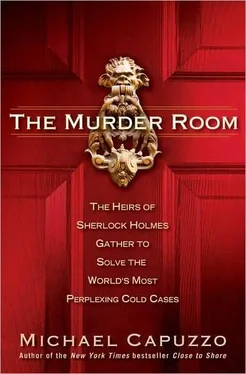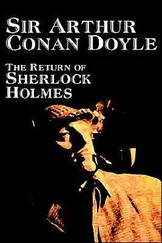His voice turned dour. “All her behavior points to a psychopath. She’s just a power-hungry witch who chooses men younger than herself and tries to seduce and control through sex and intimidation. She found one that didn’t play, or played for a while, but it was his game not hers, and she simply wasn’t going to tolerate the insult and the challenge to power.”
Walter believed Leisha had ensnared some of Scott’s coworkers, who were caught in her web of intimidation, in a conspiracy to murder him. There was powerful resentment of Scott at his job, “a lot of competitiveness, rivalries, and jealousies with coworkers.” Not only was Scott the star “stereo cowboy” and the handsome face on the shop’s TV commercials, he was cocky and brash. “He rubbed it in, got in their faces about it without realizing the risky game he was playing,” Walter said. Walter speculated that the shop was stealing and reselling its stereos, a common racket. “Scott would have gotten in their faces about that, too. One more thing to trump them with.” The week before he disappeared, Walter reminded them, “He and his boss had a fistfight out behind the shop.”
The police were tracking down Leisha’s numerous ex-boyfriends, but Walter believed the suspect list was short. “Few people had access to Scott.” The sequence of events leading to Scott’s murder began with a party at his boss’s house. Leisha was at the party, but Scott arrived with a tall, gorgeous blonde. Walter believed the blonde performed oral sex on the other men. “When I asked them they all denied it, but a lot of eyes hit the floor,” he said. At the end of the evening, he believed that Scott had trumped them all. “You think you guys are so smart, that was a transvestite! Needless to say, they were not pleased.” The revelation of that indiscretion would have ruined the life of at least one of the men at the shop. “Thus a crime already planned became a crime of improvisation and opportunity,” the profiler said.
Scott became seriously ill with the flu at the party, too sick to stand, Leisha said. Walter saw it differently; the murder conspiracy was already in motion. “I believe he was poisoned, organophosphates, something from under the sink. His extreme sensitivity to light and noise is telling.” Scott slept on the sofa at the party house, and the next afternoon, Leisha showed up and brought him home. A neighbor saw Leisha supporting the weak, stumbling young man as she led him into the apartment. It was the last he was seen by anyone other than Leisha or a coworker. Leisha said she went out to get soup and a thermometer to nurse Scott that night and the next day. When a coworker came by in the morning to pick him up for work he was still too ill. It was the last time anyone saw him alive.
It was a simple enough matter for Leisha to call on neighbor Tim Smith, a young, submissive evangelical Christian, to help with the murder. Smith had flooded her with a series of fawning love letters that included, “If only Scott wasn’t around, we could be together.” Duct tape from a roll in Smith’s apartment was used to patch the blood-soaked carpet that had been cut away and replaced in the killing room.
“This is a classic setup for a PA killer,” he said. “Just classic. A female PA relies on sexual performance and seduction, but if her power base is threatened, she will resort to violence. She’ll typically enlist trickery to disable a stronger male and/or acquire a sympathetic and weak accomplice. Leisha did both. And the PA killer classically needs to brag or flaunt the killing to claim credit, and inserts him- or herself into the investigation to exert control and power and prolong the fantasy of the murder.”
Calling attention to herself was Leisha’s big mistake, Walter said.
“How do we find out about the crime? We find out when Leisha calls Jim Dunn. She’s laying the framework, not only shaping the investigation-she knows ultimately Jim’s going to look for Scott-but she’s also exhibiting her own insatiable greed for power. She’s already done in the son; now she wants to do in the father, too. Then she tried to be coquettish with the detectives, casting herself as the wronged woman, calling them all the time with new information, pretending to be afraid of Tim Smith. She moved in with Smith so she could continue to set up her dupe to take the fall. This need for stimulation is quite insatiable for a psychopath, the ego gratification to prove they’re smarter than anyone, the gotcha.”
In the Avalanche-Journal story on Walter’s arrival in town, Leisha was quoted as saying Smith was a “suspect” in Scott’s disappearance, and had been “fiercely jealous of her relationship with Scott.”
Smith was absent from work the day of the murder, Walter said, and Hamilton can’t account for her activities that day, although her memory is extraordinary for the days around it.
The murder itself was a monstrous affair, Walter said. Scott was incapacitated with poisons, imprisoned and restrained and tortured for two days before his death, Walter believed. “This kind of killer typically uses a gun to restrain or intimidate, but close-up weapons, the kind that caused all this splattering and gives the killer emotional satisfaction, to pummel, cut, utterly destroy the victim until the killer’s fear of vulnerability is sated, and power restored. There would have been a lot of ‘You think you’re leaving me now, bitch, try this.’ What the absence and presence of evidence at the crime scene tells us is Scott intolerably challenged somebody’s power base, and paid with his life.”
After the murder, Walter said, Leisha and Tim had sex together that night in the apartment. “A little thank-you from Leisha,” Walter said. “But only after they had removed the body and cleaned up.” He smiled wickedly. “Even they have standards.”
Detective English shook his head sadly, acknowledging the depth of evil, and sat back with an audible sigh. He was persuaded by Walter’s profile of Leisha Hamilton as a psychopath-he saw why Jim Dunn had termed Walter’s insights “miraculous.” But the young detective didn’t buy the wide conspiracy, and the others weren’t nearly as impressed. All the cops knew Hamilton was withholding information; all of them considered Smith a suspect. “They were Texas polite,” Walter said. “But the whole thing was too ethereal for them.” None of it would matter, anyway, the cops said, to the DA, Travis Ware. As Sergeant McGuire told Dunn, “I have seen Ware cut people right off at the knees when he feels they don’t have a strong case. Believe me, you don’t want to talk to Travis Ware.”
Walter wasn’t listening. He was ready to see the DA. “Let’s do it,” he said. “I don’t like to fuck around.” Reluctantly, the cops led him to the office of the top lawman in Lubbock County, Texas.
The district attorney’s office was large and redolent of masculine power. Travis Ware, six feet tall, dark-haired, and impeccably attired, rose from his high-backed leather chair behind a huge polished wooden desk. In a remarkable display of dominance, he hitched one expensive black leather shoe up on the desk, towering over them with the flamboyance, Walter thought, of a matador. Leisha’s not the only PA in the room, the profiler thought, amused. Let’s see who gets gored.
Walter, Detective English, Sergeant McGuire, Lieutenant Dean Summerlin, and Captain Frank Wiley, head of Crimes Against Persons, sat in five small chairs positioned around the district attorney’s huge wooden desk like pawns around a king. In a glance Walter evaluated Ware-fortyish, reasonably good-looking, expensive gold watch peeking from under the cuff. Ah, narcissism, he thought-a weakness.
For twenty minutes, the DA talked about himself. As if to match Walter’s experience with Scotland Yard, Walter thought, he discussed his education abroad in England and the many brilliant murder prosecutions that “attested to his greatness.” Appealing to the DA’s sense of vanity, the profiler offered, “Yes, there are indeed many connections to England in this room,” and casually mentioned a “quite brilliant friend,” Dr. Richard Shepherd of London, who had helped him with the case.
Читать дальше












